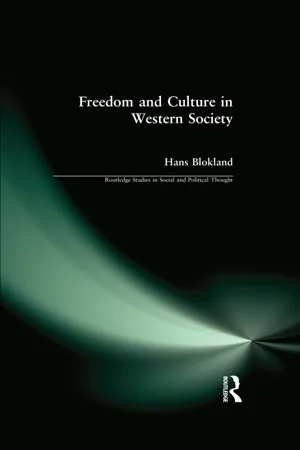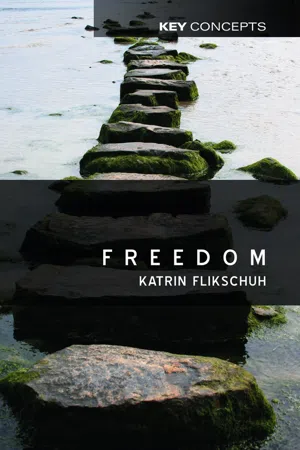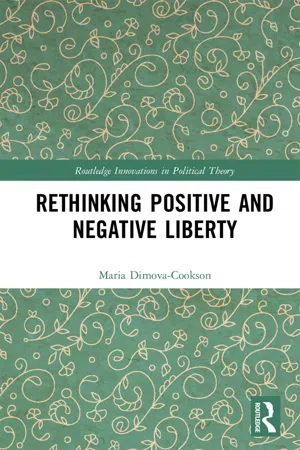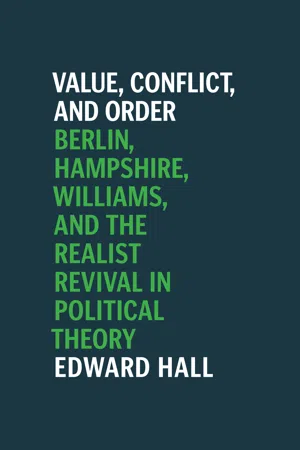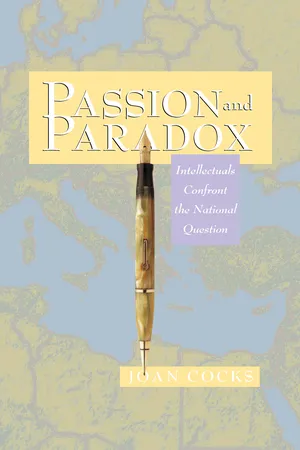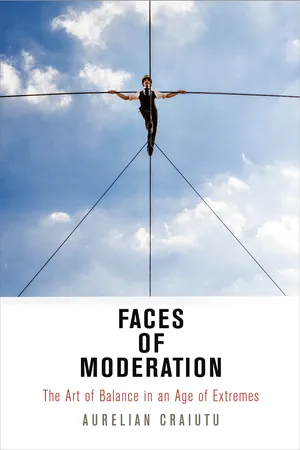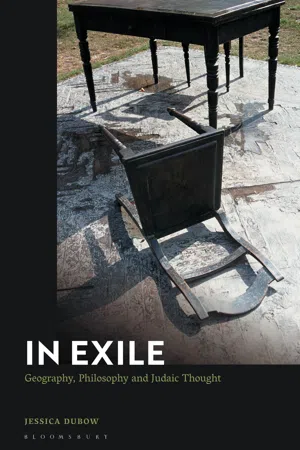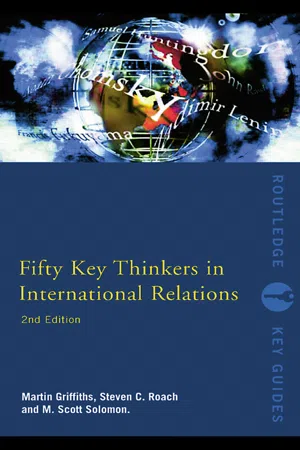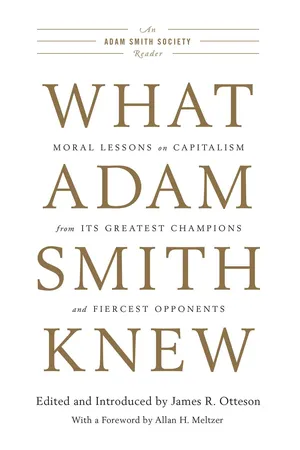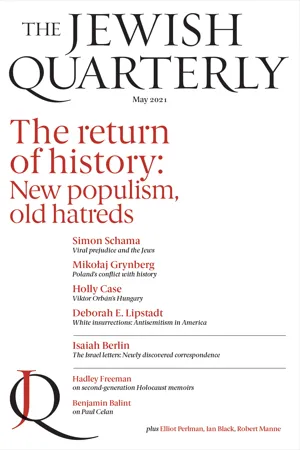Politics & International Relations
Isaiah Berlin
Isaiah Berlin was a prominent political philosopher known for his work on liberalism, pluralism, and the concept of negative freedom. He emphasized the importance of recognizing and respecting the diversity of human values and beliefs, and his ideas have had a significant impact on political thought and international relations theory. Berlin's writings continue to be influential in discussions about individual liberty and the nature of political power.
Written by Perlego with AI-assistance
10 Key excerpts on "Isaiah Berlin"
- eBook - ePub
- Hans Blokland(Author)
- 2019(Publication Date)
- Routledge(Publisher)
2 Isaiah Berlin on positive and negative freedomINTRODUCTION
Isaiah Berlin was born on 6 June 1909, the son of a Jewish timber merchant in Riga, capital of Latvia. In 1915, he left with his parents for St Petersburg, where he was to witness both Russian revolutions. From there, the family, characterized by Berlin as ‘bourgeois liberal’ emigrated to England in 1919. His father was an anglophile, which explains his choice of destination. In England, he attended St Paul’s School in London and Corpus Christi College in Oxford. He was to spend the greater part of his academic career attached to the University of Oxford, as professor of social and political theory (1957–67), chairman of Wolfson College (1966–75) and Fellow of All Souls College (1932–8 and 1960 to the present). Berlin, who was knighted in 1957, was also chairman of the British Academy (1974–8). He is mainly known for his work in the history of ideas and political theory, but has also been active in the fields of theory of knowledge and science, literature (especially Russian) and musicology.1A thread running through Berlin’s work is his crusade against the widespread monistic conviction that there is only one correct answer to every question and that all correct answers can be arranged in a harmonious manner into a single knowable rational system. Opposed to this belief, which according to Berlin has led to inertia, intolerance and cruelty, he suggests that there are many values, each of which is worth emulating in itself yet which are conflicting, so that inevitably they must be weighed up against each other. In his history of ideas, which can be characterized as a sort of phenomenology of Western consciousness, he studies in particular how this idea of pluralism has developed since the end of the eighteenth century. The philosophers Giambattista Vico (1668–1744) and Johann Gottfried Herder (1744–1803), and above all the Russian writer Alexander Herzen (1812–70) are his heroes in this history. - eBook - ePub
Freedom
Contemporary Liberal Perspectives
- Katrin Flikschuh(Author)
- 2013(Publication Date)
- Polity(Publisher)
1Isaiah Berlin: Two Concepts of Liberty?I. IntroductionIsaiah Berlin’s ‘Two Concepts of Liberty’ was first delivered in the form of a public lecture in 1958, when the Cold War was well under way.1 The essay has since been published in many different editions of Berlin’s considerable volume of work on (the history of) liberal thought. What is the abiding significance of ‘Two Concepts’ nearly fifty years on? Responses to this question will vary depending on whom one asks. Those who take umbrage at the unmistakably ideological undertones of Berlin’s essay will be inclined to say that the essay’s influence on the philosophical study of freedom has been inflated.2 Others – often those who knew him as colleague or teacher – will insist that without Berlin our understanding of liberal freedom would not be what it is today.3 From the perspective of contemporary analytic political philosophy, the significance of Berlin’s essay is often thought to lie in the fact that the contestation over ‘Two Concepts’ gave rise, eventually, to the now perhaps equally widely accepted understanding of freedom as a ‘triadic’ concept within those circles. This is Gerald MacCallum’s contention, to be examined in the next chapter, that there is only one concept of liberty – albeit one that contains both ‘negative’ and ‘positive’ elements within it.4From this last-mentioned perspective, the significance of Berlin’s essay is that it provided the opportunity for much-needed philosophical analysis and clarification of the concept of liberty, or freedom.5 This may be one way of saying that Berlin’s essay lacks the clarity and rigour demanded by current analytic philosophy. Others – often those working in the history of ideas – complain that the essay lacks a scholar’s differentiated understanding of particular philosophical thinkers in the history of ideas, that it ignores necessary attention to interpretative detail. Both charges have some warrant: not only does Berlin speak, without any sense of incoherence, of there being two distinct concepts - eBook - ePub
- Maria Dimova-Cookson(Author)
- 2019(Publication Date)
- Routledge(Publisher)
4 Isaiah Berlin, positive freedom and the impact of moral authorities on human agencyIntroduction
Berlin’s essay ‘Two Concepts of Liberty’ (hereafter TCL) is a masterpiece in moral and political philosophy.1 Readers find in it different inspirational themes,2 and they do not necessarily agree with the specific conclusions of the essay. I believe that the essay should be celebrated for its contribution not just to the analysis but also to the conceptualisation of liberty, even if this conceptualisation can be revised and improved. Berlin has demonstrated, better than any other scholar, the need for two concepts of liberty. He has suggested how the internal freedom boundary – the boundary between the two real meanings of freedom3 – should be drawn, and he has alluded to the flexibility of this boundary. Because of the scale of his philosophical aspiration, some critics have categorised his intellectual conduct as ‘ahistoric’ (Collini, 1999: 203). His ambition was to capture in clear theoretical terms the history of liberty in ‘the Western tradition in ethics and politics’ of the past ‘two millennia’ (TCL: 200). Berlin, however, is explicit about both his universalistic analytical intention and his more narrowly historical positioning on the anti-communist side of the Cold War. TCL moves in and out of its specific historical and ideological context, and this is one of the things that makes it so unique: its elaborate theoretical design is frail and, if anything, easy to challenge, but it continues to inspire philosophical fascination: ‘generations of students have cut their teeth in analytical political theory on the distinction between positive and negative liberty’ (Coole, 2013: 199). The continuous attention TCL - eBook - ePub
Value, Conflict, and Order
Berlin, Hampshire, Williams, and the Realist Revival in Political Theory
- Edward Hall(Author)
- 2020(Publication Date)
- University of Chicago Press(Publisher)
12Berlin’s work effectively suggests that such “an ascent to the a priori” ought to be regarded with deep skepticism.13 As both the negative and positive conceptions speak to genuine human interests, it is hard to see why they cannot be classed as “ultimate values” of the sort Cohen has in mind. However, Berlin’s analysis suggests that only if we pay attention to various impure considerations will we be able to grasp the merits and dangers of these competing ways of thinking about liberty and, therefore, work out which ultimate principle should guide our present political action.14 To the extent that this way of approaching things will, inevitably, rest on a disputable interpretation of how things are likely to play out if we act in certain ways, Berlin’s work also effectively suggests that our political judgments will be inherently messy and provisional in ways that much political philosophy, which seeks apodictic philosophical justification, simply fails to recognize.Many of Berlin’s comments regarding negative liberty subsequent to “Two Concepts” are revealing in this respect. He recognizes that unmitigated negative liberty generates its own social evils, as revealed by the “bloodstained story of economic individualism and unrestrained capitalist competition” (L, 37). He also claims that the New Deal was an admirable experiment in “promoting both justice and prosperity in a society without introducing the rather restrictive aspects of socialism.”15 Yet Berlin persisted with the political judgment that the positive conception of liberty was more liable to perversion, and had in fact been more dangerously perverted, than the negative conception (L, 37; CIB, 41). Left-leaning thinkers are likely to hold that the political context at the beginning of the twenty-first century is sufficiently different from Berlin’s own that we should see things in a different light.16 - eBook - ePub
Passion and Paradox
Intellectuals Confront the National Question
- Joan Cocks(Author)
- 2009(Publication Date)
- Princeton University Press(Publisher)
Chapter ThreeOn the Jewish Question Isaiah Berlin and Hannah Arendt Isaiah Berlin“Probably no one in our time has come nearer to being regarded as the academic equivalent of a saint than Isaiah Berlin,” remarks Stefan Collini in the Times Literary Supplement. Writing several months before Berlin died, after which the accolades multiply everywhere, Collini notes Berlin’s many honorary degrees, his Oxford chair, his knighthood,1 his “apparently effortless entrée into the overlapping social worlds of Britain’s upper class and governing elite.”2Collini might just as easily have cited the felicitous phrases with which others praise Berlin’s scholarly work. For example, Noel Annan describes Berlin as having written “the truest and the most moving of all the interpretations of life that my own generation made.”3 Ramin Jahanbegloo extols him for demonstrating that “history is all too full . . . of the agony of men who have tried to evade the tragic responsibility of choice by placing their faith in final and absolute truths.”4 Although he goes on to puncture Berlin’s attempt to join pluralism and liberalism, John Gray lauds his thought for being “animated by a single idea of enormous subversive force” and “profound originality”: that “ultimate human values are objective but irreducibly diverse, that they are conflicting and often uncombinable, and . . . sometimes . . . incommensurable.”5 Roger Hausheer assures those who are less favored that to meet Berlin “is to know at once why he is so celebrated,” given his “brilliance as a lecturer and talker.”6 Michael Ignatieff concludes his splendid biography of Berlin by declaring that he showed “a dark century . . . what a life of the mind should be: skeptical, ironical, dispassionate and free.”7 But perhaps nothing can quite match the rapture of Leon Wieseltier’s eulogy to Berlin, “When a Sage Dies, All Are His Kin.” Here Berlin is portrayed as “the most original, the most lucid, the most erudite, and the most relentless enemy of the idea of totality in his age, which was an age of totality” or “[m]ore precisely . . . of failed totality”—a failure that can be traced, Wieseltier claims, “not least to the notions of this professor and his crowded, benevolent mind.”8 - eBook - ePub
Faces of Moderation
The Art of Balance in an Age of Extremes
- Aurelian Craiutu(Author)
- 2016(Publication Date)
- University of Pennsylvania Press(Publisher)
5 was fascinated not only by ideas, but also by power and prestige. He loved the orderliness and peace of bourgeois life and was at home among aristocrats, politicians, and eccentric dons alike. For example, Berlin was a close friend of Chaim Weizmann, who encouraged him to immigrate to Israel in 1948; he also corresponded and met several times with Winston Churchill and John F. Kennedy. Berlin was also on familiar terms with prominent American journalists, academics, and dignitaries, from George Kennan and Arthur Schlesinger to Hamilton Fish Armstrong and Joseph Alsop. A short diplomatic stint during World War II took him to Washington, where he witnessed how important political decisions were made, and to Moscow as the Iron Curtain was about to fall over Eastern Europe. In Moscow, Berlin had the privilege of meeting two of Russia’s most important writers, Anna Akhmatova and Boris Pasternak.Individualistic and aristocratic at heart, Berlin was often skeptical and quite reserved in political matters, even though he enjoyed making political points under the guise of historical scholarship. In a letter to Jennifer Hart, he acknowledged that he liked “the history of ideas and in particular the personalities associated with ideas” (2009: 411–12), but admitted that he was far from practicing a conventional type of political theory. Ignoring the conventional distinctions and borders between philosophy, political theory, and intellectual history, Berlin’s own version of the history of ideas was, in the words of an Oxbridge colleague (Collini, 1997: 4), a form of “high-altitude aerial photography” seeking broad patterns and the company of the leading minds of mankind, “a kind of All Souls of the mind.” He was skeptical toward the conventional way of doing political theory that limits itself to a narrow subject matter and assumes that the task of the theorist is to analyze concepts only in an abstract manner. Berlin combined abstraction and synthesis like few others and deftly applied this method to the study of the Enlightenment and romantic thinkers and ideas. He was as much a historian of ideas as he was a moralist and always acted as a mediator between the texts he studied and his readers. Berlin wanted to challenge those thinkers who claimed that individuals may be seen only as parts of a larger whole and may be sacrificed for the sake of larger and nobler ends. His intention was to discourage extremist projects and fanatical ideas that often originate in “blind adherence to outworn notions, pathological suspicion of any form of critical self-examination, and frantic efforts to prevent any degree of rational analysis of what we live by and for” (Berlin, 2000: 34–35). In particular, doctrines of historical inevitability became special targets of his essays in which he defended a robust conception of individual liberty. - eBook - ePub
In Exile
Geography, Philosophy and Judaic Thought
- Jessica Dubow(Author)
- 2020(Publication Date)
- Bloomsbury Academic(Publisher)
56 Here, too, irreducible difference not only occurs between opposing value systems; it names the dividedness internal to human subjectivity itself.And so, the familiar liberal dilemma: ‘How are we to choose between possibilities’?57 What and how much must be weighed against what? Which goods should be emphasized at the expense of which others? Or, if ‘the first public obligation is to avoid extremes of suffering’,58 as Berlin phrases it in distinctly Freudian terms, how does this task sit with the inescapability of conflict? When the realization of one value is only gained with the loss of another, what of the irresolutions and remains inevitably incurred? In sum, if the price of liberty is permanent uncertainty, how do we entrust to what Berlin calls an ‘unstable equilibrium’59 : lurching between the threat of achieved satisfaction on the one hand and the threat of frustration on the other?To the extent that Berlin’s liberalism involves a certain comportment towards conflict rather than any normative model for a liberal polity, such questions remain open. Their remit, however, extends beyond the ethics of value pluralism. For Berlin’s sensibility not only bears on his distinctive political philosophy. It engages a particular experience of space; and we cannot, I suggest, approach Berlin’s pluralism without also thinking what it means to be an assimilated subject. Which is to say, a subject not only split across two geographic spaces and two incompatible states but who might inhabit what Berlin calls the ‘flow of life’60 in between: keeping to the disorientations of this ‘middle’, putting the freeze on consolatory desires, refusing both native predicates and the voyage to ‘dim … and distant ends’.61 ‘Assimilation-as-liberalism’, then, secures neither existence nor pleasure: it coincides with the undoings of spatial displacement, and with the disorders in ‘any and every space we [might wish to] call home’.62 - eBook - ePub
- Martin Griffiths, Steven C. Roach, M. Scott Solomon(Authors)
- 2008(Publication Date)
- Routledge(Publisher)
1 These two dimensions of Beitz’s project are inextricably connected to each other, as he is just as concerned to avoid the tag of ‘idealism’ as he is to defend his liberal principles.Political Theory and International Relations arose out of Beitz’s doctoral work at Princeton University in the mid-1970s. This was an interesting period, both intellectually and politically. On the one hand, political theory in the United States was emerging from a long period of slumber and marginalization in light of the dominance of positivism and behaviouralism in American political science. ‘Values’ were often associated with the emotions or ‘preferences’ of individuals, relegating morality to the realm of ‘opinions’. The dominant political philosophy in the academy was utilitarianism, which asserted the seemingly simple principle, ‘maximize social welfare and happiness’. This principle coexisted with the liberal intuition that the rights of individuals should not be sacrificed for the sake of social welfare, but those who believed in such rights lacked systematic philosophical arguments against the prevailing utilitarian wisdom. On the other hand, in the study of international relations there were signs that the dominant framework of realism was inadequate for studying a world of ‘complex interdependence’. Writers such as Robert Keohane and Joseph Nye were claiming that the image of ‘power politics’ among self-contained states, if not entirely obsolete, was inappropriate for analysing important issues and emerging trends in international political economy. Actors other than states, such as multinational corporations and transnational social movements, needed to be examined in their own right. The distribution of military power was increasingly irrelevant, they argued, while the image of ‘anarchy’ was being replaced by what Wolfram Hanreider called a ‘new convergence’ of international and domestic political processes. The politics of economic distribution was often as important as, and sometimes more important than, the politics of military security.2 - eBook - ePub
What Adam Smith Knew
Moral Lessons on Capitalism from Its Greatest Champions and Fiercest Opponents
- James R. Otteson(Author)
- 2014(Publication Date)
- Encounter Books(Publisher)
On Liberty). But if we think of freedom as including something like the freedom of self-fulfilment, or self-realization according to our own pattern, then we plainly have something which can fail for inner reasons as well as because of external obstacles. We can fail to achieve our own self-realization through inner fears, or false consciousness, as well as because of external coercion. Thus the modern notion of negative freedom which gives weight to the securing of each person’s right to realize him/herself in his/her own way cannot make do with the Hobbes/Bentham notion of freedom. The moral psychology of these authors is too simple, or perhaps we should say too crude, for its purposes.Now there is a strange asymmetry here. The extreme caricatural views tend to come to the fore in the polemic, as I mentioned above. But whereas the extreme “forced-to-be-free” view is one which the opponents of positive liberty try to pin on them, as one would expect in the heat of argument, the proponents of negative liberty themselves often seem anxious to espouse their extreme, Hobbesian view. Thus even Isaiah Berlin, in his eloquent exposition of the two concepts of liberty, seems to quote Bentham3 approvingly and Hobbes4 as well. Why is this?To see this we have to examine more closely what is at stake between the two views. The negative theories, as we saw, want to define freedom in terms of individual independence from others; the positive also want to identify freedom with collective self-government. But behind this lie some deeper differences of doctrines.Isaiah Berlin points out that negative theories are concerned with the area in which the subject should be left without interference, whereas the positive doctrines are concerned with who or what controls. I should like to put the point behind this in a slightly different way. Doctrines of positive freedom are concerned with a view of freedom which involves essentially the exercising of control over one’s life. On this view, one is free only to the extent that one has effectively determined oneself and the shape of one’s life. The concept of freedom here is an exercise-concept. - eBook - ePub
Jewish Quarterly 244 The Return of History
New Populism, Old Hatreds
- Jonathan Pearlman, Jonathan Pearlman(Authors)
- 2021(Publication Date)
- The Jewish Quarterly(Publisher)
The Israel lettersIsaiah BerlinThe philosopher and historian of ideas Isaiah Berlin met Robert Silvers, the long-time editor of the New York Review of Books, in New York in 1964. Shortly afterwards, they began a remarkable correspondence, in which they exchanged views on politics, literature, philosophy, Judaism, Zionism and family; they shared gossip and confidences, consoled each other on personal losses, and discussed opera, theatre and books. The letters spanned four decades and continued until Berlin’s death in 1997.For years, the correspondence between Berlin and Silvers sat in a warehouse in the Brooklyn Navy Yard, as part of the NYRB archive. In 2015, two years before Silvers died, the archive was sold to the New York Public Library and the letters finally came to light.This selection, running from 1967 to 1984, is published here almost entirely for the first time, annotated by David Herman. When it begins, Berlin was at the height of his fame, an Oxford professor and one of the best-known intellectuals in post-war Britain, soon to publish one of his most acclaimed works, Four Essays on Liberty.Silvers had co-founded the New York Review of Books in 1963, and it became an important home for Berlin. In December 1965 he wrote his first essay for Silvers, who went on to publish some twenty of his essays and reviews. The range of subjects in these pieces is typical of Berlin: from Russian writers like Herzen and Turgenev to European thinkers like Machiavelli, Vico and Einstein.These letters start barely a fortnight after the end of the 1967 Six-Day War. Israel is a central theme. Berlin was a lifelong Zionist and first visited Palestine in 1934. He knew Chaim Weizmann and David Ben-Gurion (the subject of his first article published in Jewish Quarterly, in 1986) but resisted their invitations to settle in the new state of Israel. “Jewish politics was too sharply polarised,” writes his first biographer, Michael Ignatieff. “He feared he would be torn to pieces.” Berlin was a friend of Israel, but a friend from afar.
Index pages curate the most relevant extracts from our library of academic textbooks. They’ve been created using an in-house natural language model (NLM), each adding context and meaning to key research topics.
Explore more topic indexes
Explore more topic indexes
1 of 6
Explore more topic indexes
1 of 4
